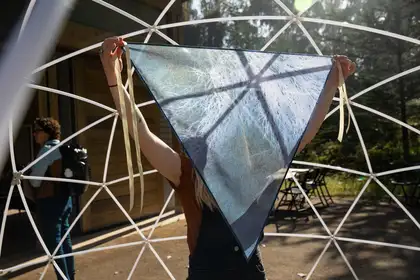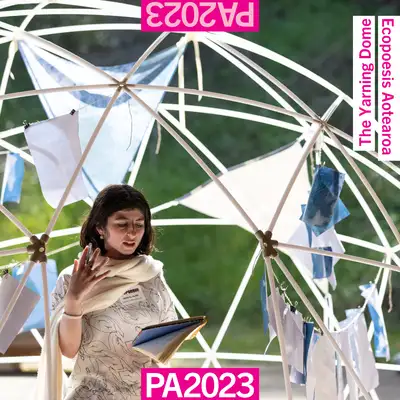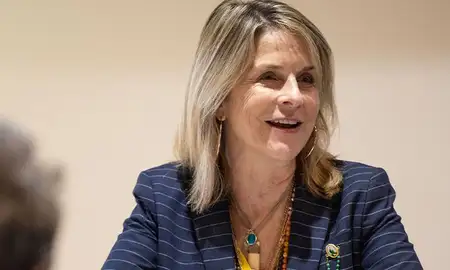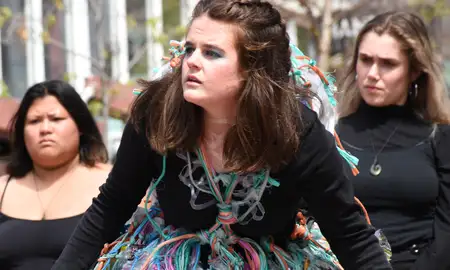
The Yarning Dome imagines a future where we can creatively adapt to climate change.
Why will 17 artists and a lot of wool and dried kawakawa leaves be gathered on a Wellington Waterfront lawn from 22 to 26 February?
They will be part of Ecopoesis Aotearoa: The Yarning Dome, an installation in The Performance Arcade, Aotearoa’s largest experimental arts festival.
The Yarning Dome is a collaboration with artists and writers from Te Whanganui-a-Tara, Tāmaki Makaurau, San Francisco, Chicago, Oamaru, Mexico and Brazil, to weave eco-poetry readings, dance, augmented reality and interactive workshops into a tapestry of provocation and contemplation, to help us imagine a future where we can creatively adapt to climate change.
Staff involved from Massey’s School of Humanities, Media and Creative Communication include Associate Professor Robert Sullivan, Ngāpuhi, Kāi Tahu, a multi-award-winning and internationally published poet with seven book-length poetry collections; creative writing Lecturer Dr Joan Fleming, a poet, essayist and climate activist; Professor Elspeth Tilley, a playwright, climate action theatre producer and artistic activism researcher; Multimedia Technician William Baird, a filmmaker and Bachelor of Communication graduate; and California College of the Arts’ Professor Leslie Carol Roberts, a Fulbright Fellow, eco-memoirist and co-founder of the international Ecopoesis movement, who has recently been a visiting scholar in the School of Humanities, Media and Creative Communication.
Dr Sullivan is delivering two ecopoetry sessions, the first with collaborator Dr Anna Jackson of Te Herenga Waka, and the second with musician and Poet Laureate Ariana Tikao, Kāi Tahu. Dr Sullivan and colleagues will read selections of their latest poems about ecologies and our relationships with land and nature, while Ms Tikao will treat audiences to the haunting sounds of taonga pūoro, for which she wrote the first concerto in 2015.
Dr Fleming will read a verse novel from her latest book Song of Less, which explores ritual and the limits of love in the ruins of ecological collapse. Professor Tilley will deliver interactive Eco Performance Poetry Workshops in which you can craft your own climate protest poem and, if you want, jump on the mic and shout it to the crowds. Professor Roberts, along with Massey fine arts graduate Tobias Allen, will deliver a hands-on printmaking workshop in which you can make cyanotypes with native plants and dyes.
Professor Tilley, who is producing the installation on behalf of the collective of artists said that, by featuring artists from seven cities, six iwi, and five universities, The Yarning Dome was an opportunity to take a multifaceted and collaborative look from different perspectives at how the arts and creativity can refresh and inform us for the work needed to combat climate change.
“We need all kinds of thinking to solve big problems, and that includes valuing artistic and creative thinking as a powerful way to help us imagine new ways to live without doing harm. Climate change is here, it is now, it is real, and we need to utilise every possible resource and approach to combat it, including recognising the huge contribution that artistic methods can make to our ability to cope and to innovate.
"One of the things that got our planet into its current state of climate crisis is humanity’s tendency to rush, to act without thinking and push forward without reflection. The Yarning Dome offers the opposite. The performances are low key and gentle opportunities to absorb beautiful creative artforms such as poetry and dance and reflect on how the arts can help us process our grief, remember what we love, and generate hope," Professor Tilley says.

The event will take place on the Wellington waterfront from 22-26 February.
In between each performance, The Yarning Dome will be open for kawakawa tea and yarning sessions. Members of Wellington yarn bombing crew Stitch and Butch will drop by to sit and knit.
“We’re also working with the fantastic sustainability initiative Mug Cycle run by Simon Edmonds from Tuatua Café. We hope you’ll bring your own keep cup for kawakawa tea, but if you forget, Mug Cycle will provide clean recycled mugs so you can sip while you enjoy the performances," Professor Tilley adds.
“The kawakawa tea and yarning sessions provide time to just sit on the lawn, perhaps noticing the sky, the earth, the ocean and the ecologies all around us, even in the capital city, unwind and process the performance or workshop you’ve just experienced. This could be a time to chat with others if you want to, or we have salvaged yarns and knitting needles if you want to participate in some craftivism by knitting as you sit. Or you can bring your ownknitting supplies.”
Featured artists include: Simone Gabriel (Ngāti Raukawa; Te Kunenga ki Pūrehuroa Massey University), Judd Morrissey (School of the Art Institute of Chicago), Karen Leef (Ngāpuhi, Te Rarawa, Tau'tu Aitutaki), Ariana Tikao (Kāi Tahu), Arihia Latham (Kāi Tahu, Kāti Mamoe, Waitaha), Debbie Broughton (Ngāti Haumia, Taranaki, Te Aitanga-a-Hauiti, Ngāti Porou, Ngāpuhi), Elspeth Tilley (Te Kunenga ki Pūrehuroa Massey University), Hana Buchanan (Ngāti Haumia, Taranaki iwi, Te Ātiawa), Janaína Moraes (Waipapa Taumata Rau University of Auckland), Dr Joan Fleming (Te Kunenga ki Pūrehuroa Massey University), Leslie Carol Roberts (California College of the Arts), Lisa Samuels (Waipapa Taumata Rau University of Auckland), Robert Sullivan (Ngāpuhi, Kāi Tahu; Te Kunenga ki Pūrehuroa Massey University), Anna Jackson (Te Herenga Waka Victoria University of Wellington), Gabriela Loza (independent filmmaker), Stitch and Butch, Tobias Allen and William Baird.
More information is available here.
Related news
ECOPOESIS. Wait, what?
When visiting Professor of Creative Writing Leslie Roberts gets anxious about climate change, she gathers people to eat, drink and make some collective art and calls it ECOPOESIS.

Massey academic develops creative activism resource
After finding it challenging to locate resources on creative activism for her students, Associate Professor Elspeth Tilley decided to develop her own.
